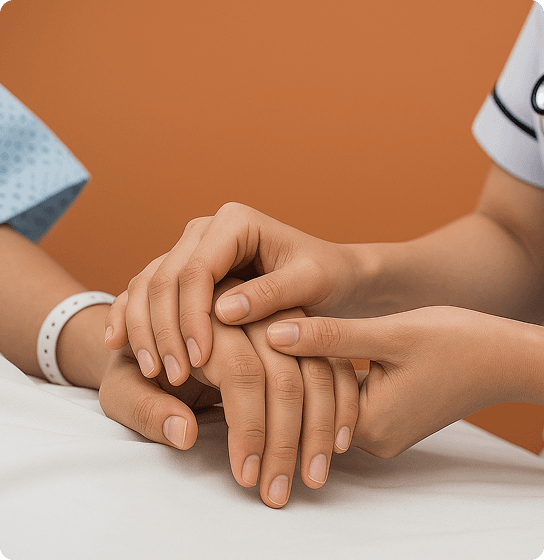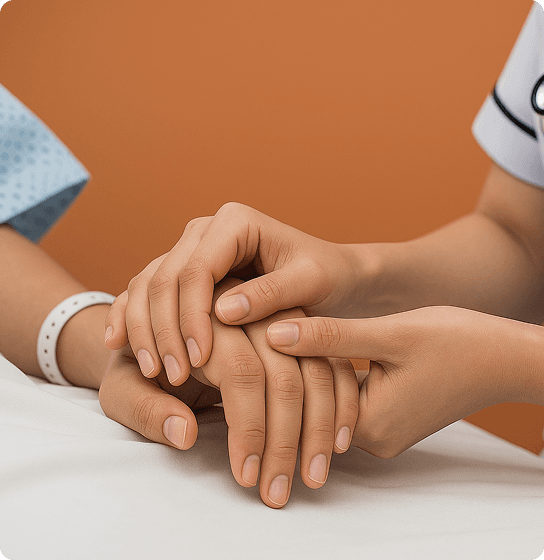
In Vitro Fertilization
IVF & ICSI are advanced fertility treatments designed to help couples conceive when natural conception is difficult. IVF involves fertilizing eggs with sperm in a lab, while ICSI involves the injection of a single sperm directly injected into each egg. The choice between IVF and ICSI is made individually, based on factors such as sperm quality, previous fertilization outcomes, and how many eggs are retrieved. Both treatments follow a structured process to maximize the chances of a healthy pregnancy.
A thorough evaluation is conducted, including medical history, fertility diagnostics, and lifestyle assessment. Tests such as hormonal blood work, ovarian reserve testing, pelvic ultrasound, and semen analysis help the doctor understand fertility status and guide treatment planning.
Supplements or medications may be recommended to optimize egg and/or sperm quality and overall reproductive health.
Hormone injections are administered daily (usually for 10–12 days) to stimulate the ovaries to produce multiple eggs. Progress is monitored through scans and blood tests to ensure optimal follicle growth.
When the eggs reach a desired size, an injection is given to complete maturation and make them capable of being fertilised. It is timed precisely for egg retrieval.
Eggs are collected under general anesthesia. It is a short procedure lasting 20–30 minutes. The procedure is performed by the vaginal route under sonographic control. Most women return home the same day. Mild bloating or cramping may occur afterward.
Collected eggs are fertilized in the lab by the IVF or ICSI technique. IVF involves placing about 100,000 sperm around the egg and one of these sperm will go on to fertilize the egg. For an ICSI procedure the egg is cleared of all extra cells surrounding it and then a single sperm which has been selected based on structure and motility is injected directly into the egg.
Fertilized eggs are cultured in the lab. Embryologists monitor their growth. Based on a number of clinical and laboratory factors such as the number of eggs, growth patterns, a decision is made about the timing of embryo transfer. This is usually on Day 3 or Day 5 after fertilization.
The healthiest embryos are selected for transfer based on the structural appearance and growth pattern. One or two embryos are gently placed into the uterus using a catheter. The procedure is usually painless and requires no anesthesia. Normal daily activities can be resumed immediately, though heavy exertion and sexual intercourse should be avoided.
Medications such as progesterone will be continued to support the uterine lining and enhance the chances of implantation.
A blood test is done approximately 12–14 days after embryo transfer to confirm pregnancy and guide further care.

For whom?
IVF/ICSI procedures are recommended for women who have not been able to conceive naturally and require advanced fertility support. These treatments can also help couples with specific male or combined fertility challenges.
They are especially suitable if:
- You have blocked or damaged fallopian tubes, making natural fertilization difficult.
- You have PCOS or endometriosis and have not conceived with simpler treatments like ovulation induction or IUI.
- You have poor egg quality, diminished ovarian reserve, or age-related fertility decline.
- Your partner has moderate to severe male factor infertility, such as low sperm count, motility, or morphology — in which case ICSI may be recommended.
- You have unexplained infertility where other treatments have not been successful.
- You’re considering fertility preservation (such as egg or embryo freezing) for future pregnancy planning.

In Vitro Fertilization
IVF & ICSI are advanced fertility treatments designed to help couples conceive when natural conception is difficult. IVF involves fertilizing eggs with sperm in a lab, while ICSI involves the injection of a single sperm directly injected into each egg. The choice between IVF and ICSI is made individually, based on factors such as sperm quality, previous fertilization outcomes, and how many eggs are retrieved. Both treatments follow a structured process to maximize the chances of a healthy pregnancy.
A thorough evaluation is conducted, including medical history, fertility diagnostics, and lifestyle assessment. Tests such as hormonal blood work, ovarian reserve testing, pelvic ultrasound, and semen analysis help the doctor understand fertility status and guide treatment planning.
Supplements or medications may be recommended to optimize egg and/or sperm quality and overall reproductive health.
Hormone injections are administered daily (usually for 10–12 days) to stimulate the ovaries to produce multiple eggs. Progress is monitored through scans and blood tests to ensure optimal follicle growth.
When the eggs reach a desired size, an injection is given to complete maturation and make them capable of being fertilised. It is timed precisely for egg retrieval.
Eggs are collected under general anesthesia. It is a short procedure lasting 20–30 minutes. The procedure is performed by the vaginal route under sonographic control. Most women return home the same day. Mild bloating or cramping may occur afterward.
Collected eggs are fertilized in the lab by the IVF or ICSI technique. IVF involves placing about 100,000 sperm around the egg and one of these sperm will go on to fertilize the egg. For an ICSI procedure the egg is cleared of all extra cells surrounding it and then a single sperm which has been selected based on structure and motility is injected directly into the egg.
Fertilized eggs are cultured in the lab. Embryologists monitor their growth. Based on a number of clinical and laboratory factors such as the number of eggs, growth patterns, a decision is made about the timing of embryo transfer. This is usually on Day 3 or Day 5 after fertilization.
The healthiest embryos are selected for transfer based on the structural appearance and growth pattern. One or two embryos are gently placed into the uterus using a catheter. The procedure is usually painless and requires no anesthesia. Normal daily activities can be resumed immediately, though heavy exertion and sexual intercourse should be avoided.
Medications such as progesterone will be continued to support the uterine lining and enhance the chances of implantation.
A blood test is done approximately 12–14 days after embryo transfer to confirm pregnancy and guide further care.
For whom?
IVF/ICSI procedures are recommended for women who have not been able to conceive naturally and require advanced fertility support. These treatments can also help couples with specific male or combined fertility challenges.
They are especially suitable if:
- You have blocked or damaged fallopian tubes, making natural fertilization difficult.
- You have PCOS or endometriosis and have not conceived with simpler treatments like ovulation induction or IUI.
- You have poor egg quality, diminished ovarian reserve, or age-related fertility decline.
- Your partner has moderate to severe male factor infertility, such as low sperm count, motility, or morphology — in which case ICSI may be recommended.
- You have unexplained infertility where other treatments have not been successful.
- You’re considering fertility preservation (such as egg or embryo freezing) for future pregnancy planning.
